Your Ad Could Be Here - For As Little As $25 Weekly! - Call 618-494-2068
Illinois School Funding Threatened - UPDATED
Gillespie – On Tuesday of this week, Illinois Gov. Bruce Rauner issued an amendatory veto to Senate Bill 1 (SB1). This bill, if passed, will fundamentally change how schools are funded throughout the state. The matter now heads to the Illinois General Assembly, where the governor has requested that lawmakers uphold his changes.
“It doesn’t matter where you come from or who your family is. With a great education, you can go anywhere in life and be whomever you want to be. You can grow up, get a good job and provide for your family. That’s why the changes I have made to the education funding bill are so important,” Gov. Rauner said. “With my changes, our state ensures that enough resources flow to children in the poorest and most disadvantaged school districts across the entire state. And my changes ensure that the education funding system in our state is fair and equitable to all students in Illinois.”
A well attended town hall meeting was held at Gillespie High School on July 27th that featured speakers that included SB1 sponsor Illinois Senator Andy Manar, State Comptroller Susana Mendoza as well as local school district superintendents and others with an interest or investment in education. At this meeting the importance of passing SB1 and how it will impact funding was discussed. The meeting lasted nearly two hours and was covered by local, St. Louis and Chicago media.
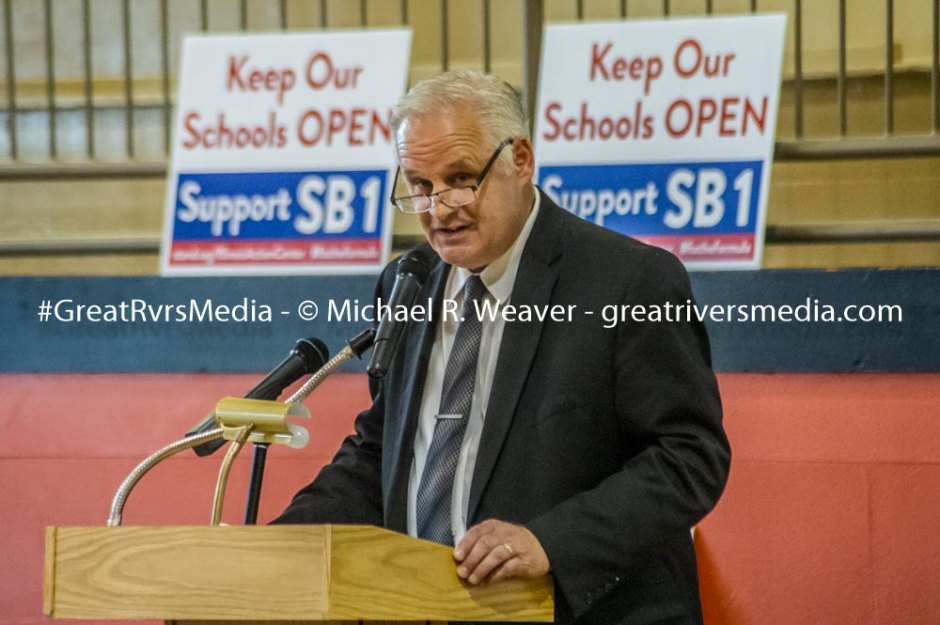
At the opening of the meeting, Gillespie schools Superintendent and host Joe Tieman related that his district has a 71% poverty rate and spends 32% less than the state average on instruction. Tieman said he believes that SB1 means fair and equal funding. Tieman said, "I ask for nothing more than my students have the same opportunities as any other student in this state. It really is that simple." He also related that the lack of proper state funding, proration and categorical payment over the last eight years in his district has resulted in the loss of $3,500,000. He explained that his district has eliminated twenty positions in the areas of food service, custodial maintenance, clerical, student guidance, transportation and administration as well as thirteen teaching positions that include media services, music, reading specialists and regular education classroom teachers. Tieman again emphasised the impact and problem by saying, "Thirteen teachers in a district with a 71% poverty rate. The question our political leaders need to ask themselves is what kind of school do you want for the students that do not live in wealthy districts? A school with overcrowded classrooms? A high school with no or few electives? A school with no fine arts, because that's where we're headed."
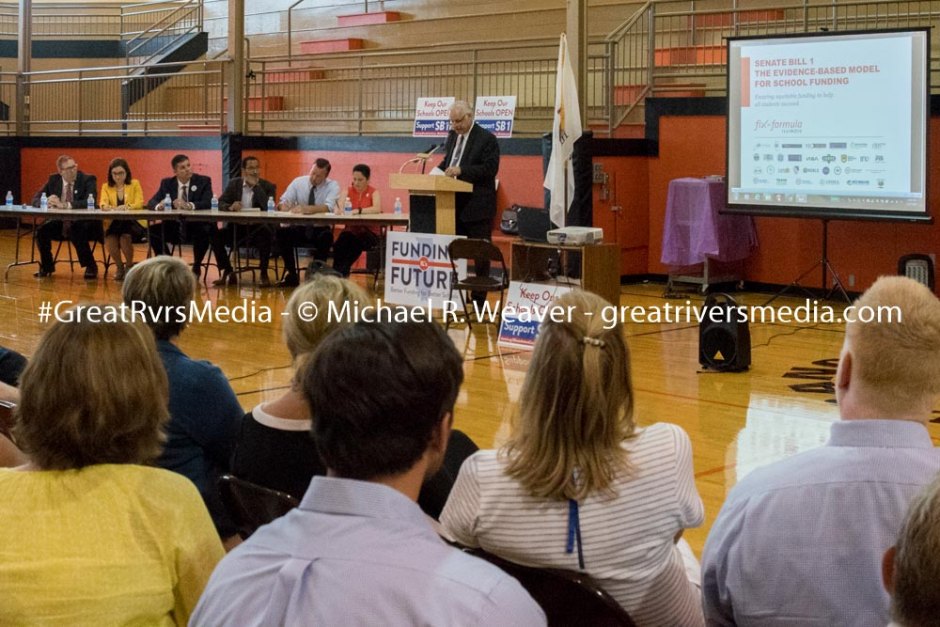
Continuing, Tieman said, "State government has failed every student, every teacher, every parent. “When does the madness stop and we start funding our schools in a fair and equitable manner? The Gillespie School District has amazing success with and achievement and I don’t want to tear it down.”
The next speaker, Brad Skertich the Southwestern Superintendent, responded to the then possible amendatory veto and overall state school funding crisis in this fashion at a recent meeting at Gillespie.
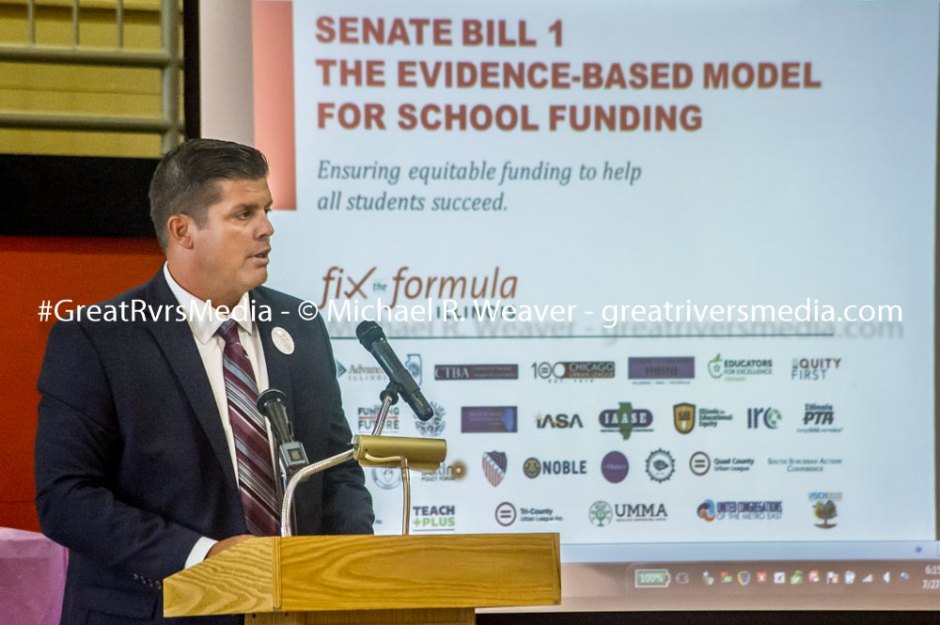
Skertich said that Southwestern relies on the state for approximately 50% of its' funding. He said of area districts, he felt Southwestern, Staunton and Gillespie had felt the state aid cuts the most. Skertich said, "Now since this school funding reform fight has started, we have been accused of being influenced by a greater political power. Our influence was fighting for our kids locally, not anyone else. That fight started in December of 2013 and continues today. I want to be very clear, we started our fight in the basement of Litchfield Hospital."
“Illinois has the most inequitable school funding mechanism in the country,” he said. “That has been the catalyst for us locally and throughout the state meeting with leaders about change. Despite not passing a funding reform, Democrats and Republicans all agree our funding formula is inequitable”
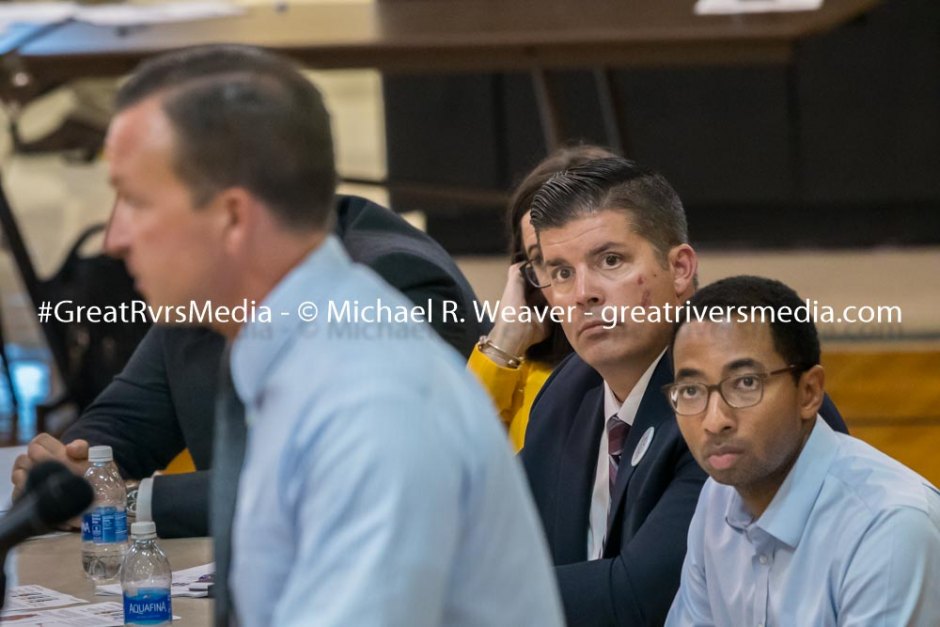
Skertich pointed out that even after 18 months of the bi-partisan school funding commission formed by Gov. Rauner, and after hours of work, they have not been able to establish an adequate new funding formula for the broken system but were able to issue a report that points to an evidence based funding formula that is the basis for SB1.
Dan Cox, superintendent of Staunton schools, opened his remarks with "Illinois has the worst education funding system of any state in the nation. Let me repeat myself. Illinois has the worst education funding system in the nation."
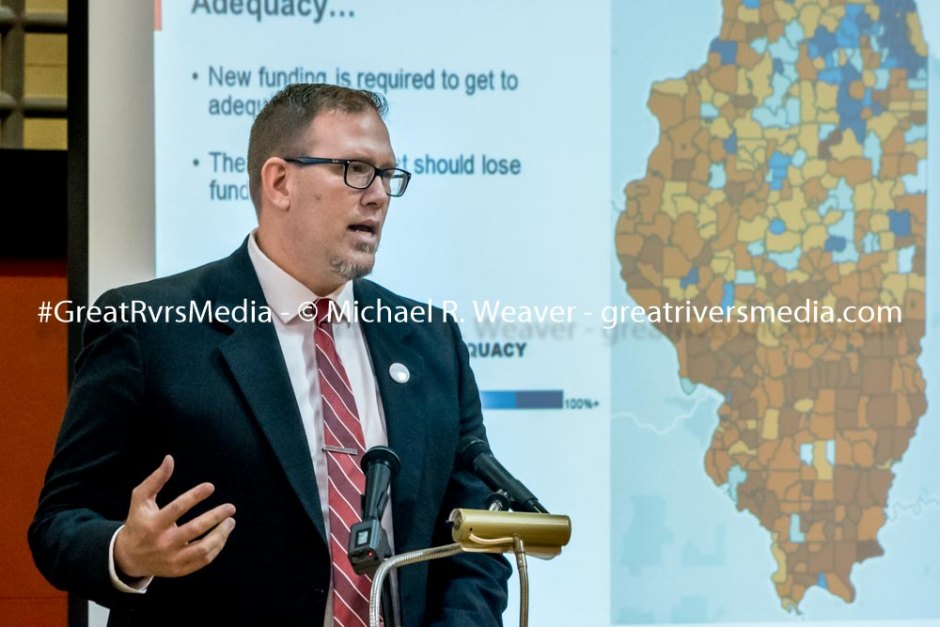
Cox said he was glad people gathered in Gillespie to talk about Senate Bill 1, but that truthfully, everyone needed to be in Springfield talking to both chambers of state government.
“As a superintendent I set out to make a positive difference in the education and the lives of our kids,” he told the audience. “Daily, my colleagues and I are faced with decisions based on what does the least harm to our kids instead of what's based on their educational interest. We are fighting to keep our doors open and for basic fair funding throughout Illinois. Illinois Senate Bill 1 is the best plan for all the kids. There are certainly no winners and losers and it's certainly not a bailout. It's a proportionate distribution of funds and that's a fact.”
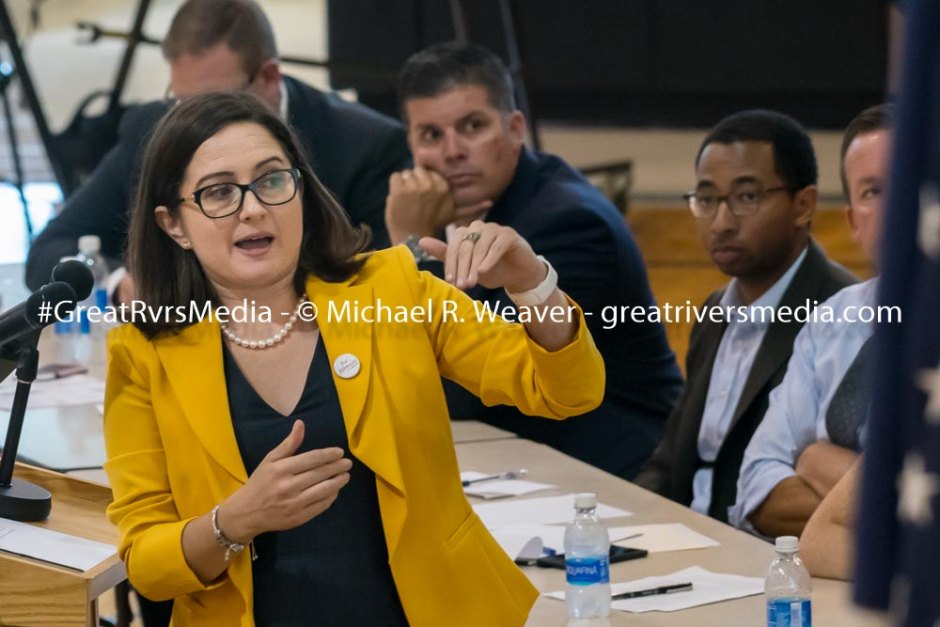
Next to the podium was Dr. Teresa Ramos, Director of Community Engagement with Advance Illinois. Advance Illinois is a education advocacy organization that identifies, designs and advocates for policies that are tailored to the needs of students in Illinois.
Ramos said that a new coalition member, the Illinois PTA, supports SB1 Because no districts lose money. She continued, "That's what has made this evidence based model one of the most powerful models for fair school funding in this state. What we don't want is equal funding. Equal doesn't always mean fair. We know there are diverse learners throughout the state. Different students have different needs. Different communities have different needs. We want adequate and equitable funding."
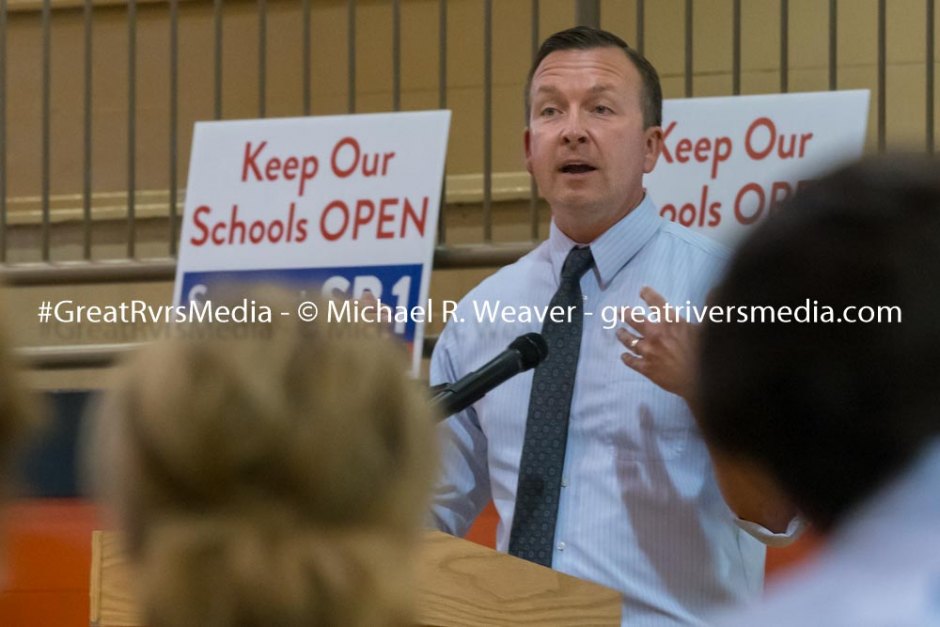
Sponsor of SB1 bill Senator Andy Manar told the audience that the school superintendents in the area that he represents are the ones that actually wrote the bill, not him. Manar said, "This bill is good public policy. We could approach this from one geographic perspective or another but that would be doing a disservice to you as taxpayers. This is a statewide problem and we believe that SB1 is a statewide solution." He said that when he took office he was unaware of the of the depth of the problems that rural downstate schools faced but that after several hours of school superintendents explaining what they faced he knew that if the state didn't do something that down the road things in our neck of the woods was going to change for the worse. Manar said, "We know that downstate school districts have been at the end of the line for years. The compelling reason for us to change the system, I'm going to be blunt, is our survival and the survival of rural school districts in the state of Illinois... This is not about a Chicago bailout. Anybody who tells you that or leads you down that path is deliberately trying to misinform you for political reasons."

State Representative Christian Mitchell, who is from Chicago's south side, told the crowd that the school funding bill doesn't give Chicago everything it wants in this bill. He said, "We didn't get the best deal if you want to put it that way. Let's put it that way. Part of the reason we didn't is of because of folks like Senator Manar said hey, you are getting enough... I support this bill not because it gives every child everything it needs but because it gives every student in this state a better chance." He went on to say, "I want to address two other things and most of it has to do with some of the rhetoric you have heard from opponents of this bill. Some of the Governor's folks and some other senators and representatives have promoted another bill, Senate Bill 1124 which includes something they call a per pupil hold harmless. The idea is that if a district loses population, that district would lose money. On the surface, maybe that seems to make some sense and by the way it would whack Chicago exceptionally hard. Which is where they are getting a bunch of this money they are saying would now come to school districts like Gillespie and the others that we have talked about tonight. But what they don't tell you is that in a few years, when we go to a per pupil hold harmless, the school districts that would be actually hurt the most would be downstate school districts.
They are school districts south of I-80 that have lost manufacturing jobs, where coal is not quite recovered. Those are the school districts like we are standing in right now. You all would be hurt more by that proposal than I would as a representative living in Chicago... There have been attempts by opponents of this bill to divide us along lines frankly of race and class, not just of geography and I'm here tonight because I want us to resist that."
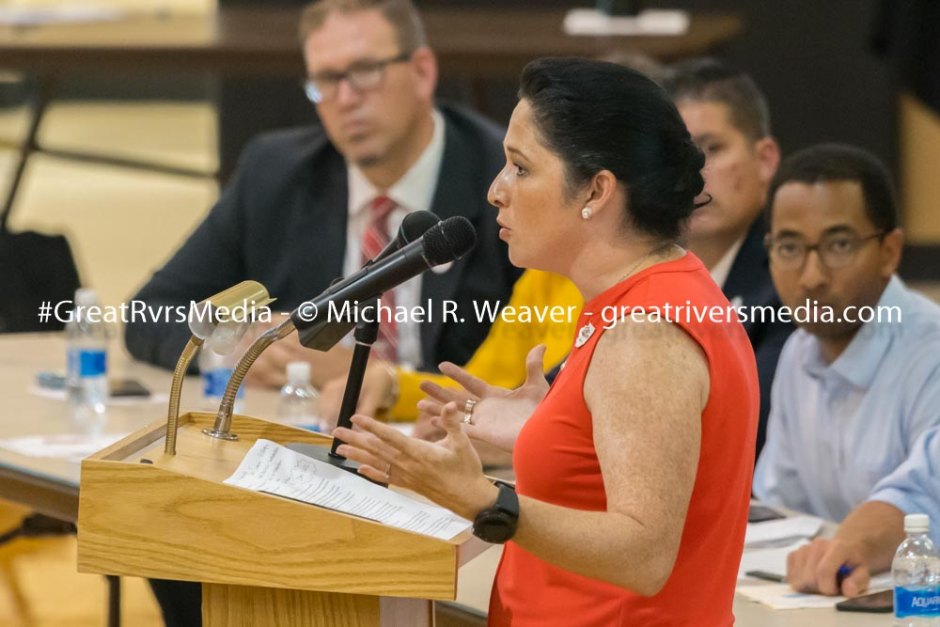
Illinois Comptroller Mendoza praised the work of Senator Manar and went on to tell that she sees the divisions that Congressman Mitchell referred to as she travels the state. She stated, "We are at a point in the very near future where the state of Illinois, for the first time in its history, may not be making a payment to general state aid to schools." Mendoza went on to say, "The administration is doubling down on disaster."
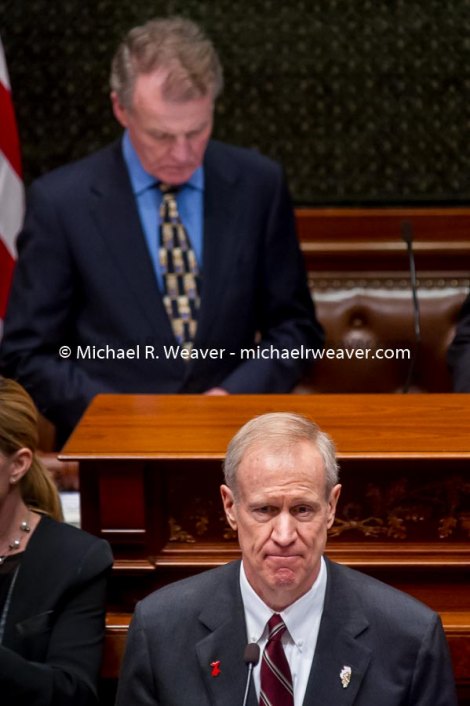
“The changes included in my amendatory veto reflect years of hard work by our education reform commission and our ability to overcome our political differences for the good of our young people’s futures,” Gov. Rauner said. “I urge the General Assembly to act quickly to accept these changes and let our students start school on time.”
The Governor’s amendatory veto makes the following substantial changes to SB1:
- Maintains a per-district hold harmless until the 2020-2021 school year, and then moves to a per-pupil hold harmless based on a three-year rolling average of enrollment.
- Removes the minimum funding requirement.
- Removes the Chicago block grant from the funding formula.
- Removes both Chicago Public Schools pension considerations from the formula: the normal cost pick-up and the unfunded liability deduction.
- Reintegrates the normal cost pick-up for Chicago Public Schools into the Pension Code.
- Eliminates the PTELL and TIF equalized assessed value subsidies.
- Removes the escalators throughout the bill.
- Retains the floor for the regionalization factor.
- The amendatory veto also removes the accounting for future pension cost shifts to districts in the Adequacy Target.
Gov. Rauner says his changes in the amendatory veto contain much information that was established by the Illinois School Funding Reform Commission. The veto also appeared to be misunderstood by the Governor and his staff as to how to how it needed to be handled by the legislature during a press conference.
Transcript of Governor and assembled reporters:
REPORTER: What makes you think that three-fifths of the House and three-fifths of the Senate will agree on any particular thing here?
RAUNER: Well, upholding — Dave, it’s a great question — upholding my, uh, amendatory veto and passing it in concurrence requires a simple majority. Upholding my amendatory veto, supporting the changes I’ve recommended.
REPORTER: Democrats say otherwise because of the immediate effect because it needs to take effect immediately.
RAUNER: So, okay, so, upholding it can be a simple majority, and frankly, um, they could pass a new bill with exactly the changes this afternoon and I could sign it.
REPORTER: They have a Supreme Court opinion that disagrees with your take on a simple majority.
RAUNER: Okay.
REPORTER: Wouldn’t that be something though that your staff would have found out before you did this? Are you concerned at all that there’s a big difference between a simple majority and three-fifths and this could all blow up?
RAUNER: What we need is fair and equitable funding. This bill should have been sent to my desk, um, June 1st. I acted exactly quickly, exactly as I laid out, exactly as my constitutional authority, um, sets and we’re acting to protect all of our children, all across the state, including the city of Chicago and treating them equitably.
According to multiple sources that have weighed in on the veto of SB1, the General Assembly has three options:
- It can do nothing, effectively killing the bill.
- It can override the veto by a three-fifths majority of each chamber.
- It can agree with the recommendations made by the governor by a simple majority vote in each of the chambers.
The fate of SB1 before the General Assembly is now unknown, but now is a critical time for not only the upcoming 2017-2018 school year funding but also for years to come.
The series will continue with local school district views and what they are facing.


